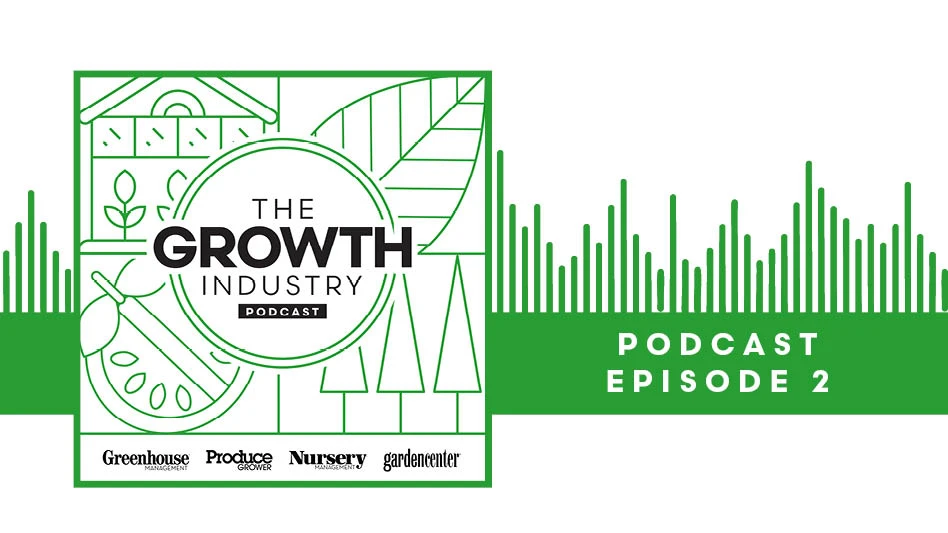
From watering at the Avon, Ohio nursery at 10 years old, Willoway Nurseries’ president Tom Demaline never had any doubt about going into the family business. In seventh grade, he began growing containers with his dad, and never looked back.
“I knew where I was going,” he says. “I had a path.”
Soaring with EAGL. That path wasn’t always smooth. Sometimes it was a loose gravel road, and at times, there were massive potholes to avoid. The economic recession was one of the toughest challenges for Tom and Willoway Nurseries. So he did what he’s done for 40 years — look for ways to improve.
“It was a great ride until ’09 when the whole industry hit the wall,” he says. “We had to reinvent ourselves. That’s what EAGL did.”
Tom was one of nine participants in the first Executive Academy for Growth & Leadership (EAGL) program. The one-year program was specifically designed for nursery and greenhouse growers to improve their business skills and develop strategic plans for their companies.
“EAGL made you step back and look strategically at the business — what you had to change and how you had to drive change to make a difference,” Tom says.
All of the participating growers received a continuing education Certificate in Applied Horticultural Business Management from program partner Texas A&M University. Tom liked how the curriculum designed by Dr. Charlie Hall of Texas A&M and Kip Creel of StandPoint Inc. was practical, not theoretical. Also, working with a peer group of other growers in his exact predicament was particularly helpful.
“We learned a lot from each other,” Tom says. “With Charlie and Kip’s leadership, we were able to take things apart to figure out what was working and what wasn’t working and how to take it to the next level.”

The program’s final project was a complete strategic plan for his business, presented to an evaluation panel of accomplished executives from other industries.
Playing the Great Game
Tom returned from the EAGL program with new ideas for implementing a strategic plan and marketing the business. But the situation hadn’t improved to where he’d hoped. The business was at a crossroads. Willoway had lost 15 percent in volume during the recession, and Tom just could not find a way to grow it back.
“In the downturn we were kind of stuck, even after EAGL, so I kept looking for what was going to change the game,” he says.
What he found was “The Great Game of Business.” Jack Stack’s influential book told the story of how a company on life support was able to survive and then thrive by implementing an unusual management style. The basic premise behind “The Great Game of Business” is open-book management. That means sharing the numbers behind the business with everyone in the business. An employee that understands how his or her job impacts the company’s bottom line is more engaged.
Willoway conducted an employee survey during the recession. Tom learned that his people like their jobs and thought they were fairly compensated, with sufficient benefits. What they wanted was more voice in the company’s direction. They wanted to be part of the solution. After seeing the results of that survey, Tom brought the idea back to the nursery.
Emily Showalter, Willoway’s human resources manager and Tom’s niece, says the move to open-book management was an example of her uncle’s open-minded outlook on running a business.
“He went to the conference where he learned about that, came back and presented it to me, our CFO and my mom, and we just about thought he was crazy,” she says. “But from my experience, a lot of the ideas he brings up will be successful. We trust that.”
Willoway adapted Stack’s system, and is currently on its third year of open-book management.
Tom liked the concept of creating a business full of employees who think like owners. But providing financial data to employees would be near useless without them being able to understand what the numbers mean. For that reason, some basic financial education may be necessary for the process to work. Letting employees see the numbers allows them to watch those numbers change, which shows the impact their actions can have on those numbers. The company’s goals become the employee’s goals because they help set and take ownership of those goals.
“The great thing about open-book management is that it makes you explain the ‘why,’” he says.

“Why do we do what we do? It isn’t because Tom said so; there’s a reason behind it. So you get everybody to get buy in, use the wisdom of the crowd and collectively find the best solution to move forward.”
To help open up the business, the nursery produced a series of “Why Willoway?” videos available on its website and YouTube channel. The videos were designed to demonstrate what makes the nursery special to customers, but they also have been used internally to help employees understand their coworkers’ jobs. Tom says that breaking down the walls between departments has broadened his employees’ knowledge of how the larger business works.
From there, Willoway began cross-training employees. There was some initial pushback.
“When we started, our employees thought ‘If I teach you my job, I might be out of a job,’” Tom says. “So we had to show them you’re worth more if you can do three different things than just one. We added value that way.”
The cross-training has reduced Willoway’s labor costs, because the nursery is better able to utilize its staff. When the departments were focused only on their own tasks, the department heads would keep their people busy, but what they were doing wasn’t always lined up with the nursery’s top goal. For instance, in the fall when every available person is needed to cover the nursery, or when they are running the canning machine nonstop, employees shouldn’t be spending time on lower-priority tasks.
As a solution, Willoway established a labor pool. Employees can see their requirements by task. Now, cross-trained employees could check orders in the morning and trim in the afternoon, or they could be potting in the morning and loading trucks in the afternoon.
“It used to be, ‘Well, I can’t give you my guy because I don’t have anyone else who’s trained,’” Tom says. “Well, let’s get more people trained.”

Gaming the system
One of the other tenets of “The Great Game of Business” is the use of “MiniGames” to focus employee attention on solving a particular problem or strengthening a weakness. Most people like to play games, so this not only makes the work more enjoyable, but rallies the employees to accomplish those goals to get a “win” or try for a new high score, which is often accompanied by a small reward.
The No. 1 thing is you can never stop learning. That’s what got me to where I’m at; I’ve never stopped learning. You’ve got to stay involved and push yourself to the next level.
As part of open-book management, Willoway has a 30 minute meeting every Friday morning. It’s broadcast to each of the nursery’s seven locations and Premier Plant Solutions distribution centers. During the meeting, Tom and his management team recap the week, communicate any major goings-on in the business, and go over the “wins” of the week.
The MiniGames are small by design. After Willoway changed the name of its plant distribution centers to Premier Plant Solutions, the staff had a MiniGame to encourage customers to call orders in ahead of time. They had a goal of 100 for April and May, and they ended up with more than 200. Encouraging people to change their habits is difficult, but the goal was to improve efficiency by pre-pulling the early orders.
“We’re more efficient, the customer is happier, everybody won,” he says.
Another MiniGame has helped improve the nursery’s fulfillment rate. Typically, Willoway’s average fulfillment rate was 95.5 to 96 percent. Tom thought they could do better, and began putting emphasis on that statistic. He set a goal of 98.75 percent, and every two weeks, if his staff beat that number, everyone received a continental breakfast at the Friday meeting. Since the MiniGame started, fulfillment has hovered right at 99 percent.
“We gained 4 to 5 percent on our fulfillment rate, which is a significant amount of dollars,” Tom says. “We sold it, the customer wants it, all we have to do is get it out of the truck. It has to do with inventory accuracy, everybody’s involved. When you put focus on something, it becomes a priority for the whole management team, for the entire company.”
Tom says Willoway currently has 30 to 40 MiniGames running throughout the business. The ideas often come from the employees themselves, which is a big part of employees thinking like owners.
“If people are part of the solution, they’ll generally accept the results,” he says.
Planning for the future
Willoway has been a family business since Tom’s father, Les Demaline, founded it in 1954. Tom and his sister, Cathy, have worked alongside the employees in nearly every phase of nursery production and management at one time or another. Currently, Cathy manages the greenhouse, and her husband Jay Kowalczyk runs the field operation.

Several members of the next generation are involved in the business, as well. Emily, Tom’s niece, began overseeing the company’s three Premier Plant Solutions distribution centers last fall.
Tom’s son, Eric, also works for the company as transportation coordinator. He handles truck logistics and moving the internal shuttles in the nursery and deliveries of the five drivers he oversees.
Tom’s daughter and son-in-law returned to the family business this past fall, as well. Tom’s daughter, Karen, is the accounting manager, and her husband John Terhesh is the head grower at Willoway’s Avon nursery.
Tom is 60 years old, and he wants to retire at 70. Succession planning isn’t something that happens overnight.
“When I announced last year that I was going to retire in 10 years, the whole room gasped,” he says, laughing. “I said, ‘What, do you think I’m going to live forever?’”
It boiled down to three options: give the business to the kids, sell the business, or close it down. Either selling or closing would take five to 10 years, he explains.
“I’m sticking cuttings and grafting plants I’m not going to sell for 10 years,” he says. “You have to change the whole production plan to phase the business out when you grow these long-term crops.”
As part of the succession plan, Willoway’s next generation is stepping up into new leadership roles. Emily, who has been learning the ropes as COO of Premier in addition to her HR responsibilities, says many businesses keep their heads in the sand instead of preparing for the inevitable.
“A lot of businesses struggle with that fact and it gets to the very end, where ‘Oh no, what are we going to do? I’m leaving tomorrow and nothing is in place,’” she says. “He’s said, ‘I want to start stepping away within the next 10 years; let’s get a plan together.’”
When Tom approached Emily and her cousins about coming into the business as owners, he stressed that he didn’t want to leave them a burden. The family would work together to keep the nursery and its related businesses successful so they could carry it on for many more years.
That means Tom won’t be spending all his time hunting just yet.
“They need me to mentor them for a while, but at some point, they need to sit in the driver’s seat and I’ve got to step back,” he says. “I can’t do what I’m doing until I’m 70, then say ‘Here’s the keys, I’ll see you guys later.’ It wouldn’t be fair to them.”

Get involved
Emily believes part of Tom’s success can be attributed to his ability to collect data, assess risk, and make a good decision balancing each factor.
“He loves to be different,” she says. “He definitely is OK with change and not stuck in the old ways. That’s inspiring, taking leaps and bounds and being able to handle something that did not go perfectly the way he thought it was going to go.”
Willoway takes risks when the gamble makes sense. But it doesn’t always work out, and when that happens, he says to dust yourself off and try something different. Tom’s parents, Les and Marilyn, instilled in him from the beginning that the nursery should always be striving to be the best it could be from a quality and service standpoint. Whether it’s a state-of-the-art greenhouse or testing container spacing robots, Willoway aims to be on the cutting edge of innovation and mechanization.
“This industry has a tendency to get stuck in the past — which is fine — but someday you’re going to be obsolete,” Tom says. “You have to make sure you’re not painting yourself into the corner. You paint yourself into that corner pretty easily by not investing in your company. You can live on the laurels for a few years, but at some point the gas tank is empty. So you have to continue to reinvest.”
One way Tom keeps up with the latest tech and innovations is through his involvement with associations. He’s the incoming chairman of the board for AmericanHort and has held numerous positions with local, regional and national associations. In late April, he even traveled to the White House to participate in a “farmers roundtable” with President Trump and Secretary of Agriculture Sonny Perdue. Tom brought the nursery grower’s perspective to the labor crisis for the entire roundtable group, but he was quick to deflect credit.
“It wasn’t about Tom, it was about the nursery industry having a seat there, and having somebody actually listen,” he says.
Tom says the meeting was positive, and both the president and agriculture secretary left with a better understanding of the needs and issues. The difficulty, as always, is convincing Congress. Still, Tom is a believer that you have to get involved in politics if you want to get anything out of it.
“People say ‘I’m not going to get involved because my opinion won’t make a difference,’” he says. “That’s where people get lost. Every voice that’s out there has value. It builds those relationships where you can call your congressman up and say, ‘Hey, this affects me, and this is how.’ If you don’t voice your opinion and be part of the solution, nothing is going to change.”
Tom continues to look for a better way. He’s sticking with the wisdom of the crowds gained through “The Great Game of Business,” because collectively, your team is smarter than you are alone.
“The No. 1 thing is you can never stop learning,” he says. “That’s what got me to where I’m at; I never stopped learning. You’ve got to stay involved and push yourself to the next level.
“We’re on a journey. There is no end, just moving forward toward where you want to go.”

Explore the July 2017 Issue
Check out more from this issue and find your next story to read.
Latest from Greenhouse Management
- pH Helpers
- Society of American Florists accepting entries for 2025 Marketer of the Year Contest
- Sustainabloom launches Wholesale Nickel Program to support floriculture sustainability
- American Horticultural Society welcomes five new board members
- Color Orchids acquires Floricultura Pacific, becoming largest orchid supplier in U.S.
- American Floral Endowment establishes Demaree Family Floriculture Advancement Fund
- The Growth Industry Episode 3: Across the Pond with Neville Stein
- 2025 State of Annuals: Petal power







